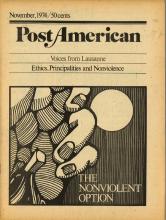The International Congress on World Evangelization met in
In some ways this Congress was unlike previous “missionary conferences.” Third world participants played a major role in both the major addresses as well as the small group workshop sessions. There were workshops on national strategy as well as “demonstrations of evangelistic methods” (which included such methods as personal evangelism, evangelism through literature, local church evangelistic campaigns, evangelism by drama and art, open-air evangelism, evangelism through distribution of Scriptures, and evangelism through social action and community development). Discussions in the “theology of evangelization groups” included: the uniqueness and authority of the Bible; Jesus Christ—the unique Son of God; how to evaluate cultural practices by biblical standards while maintaining the cultural identity of the country; and the kingdom of God and its relationship to political utopianism and cultural revolution.
Read the Full Article

